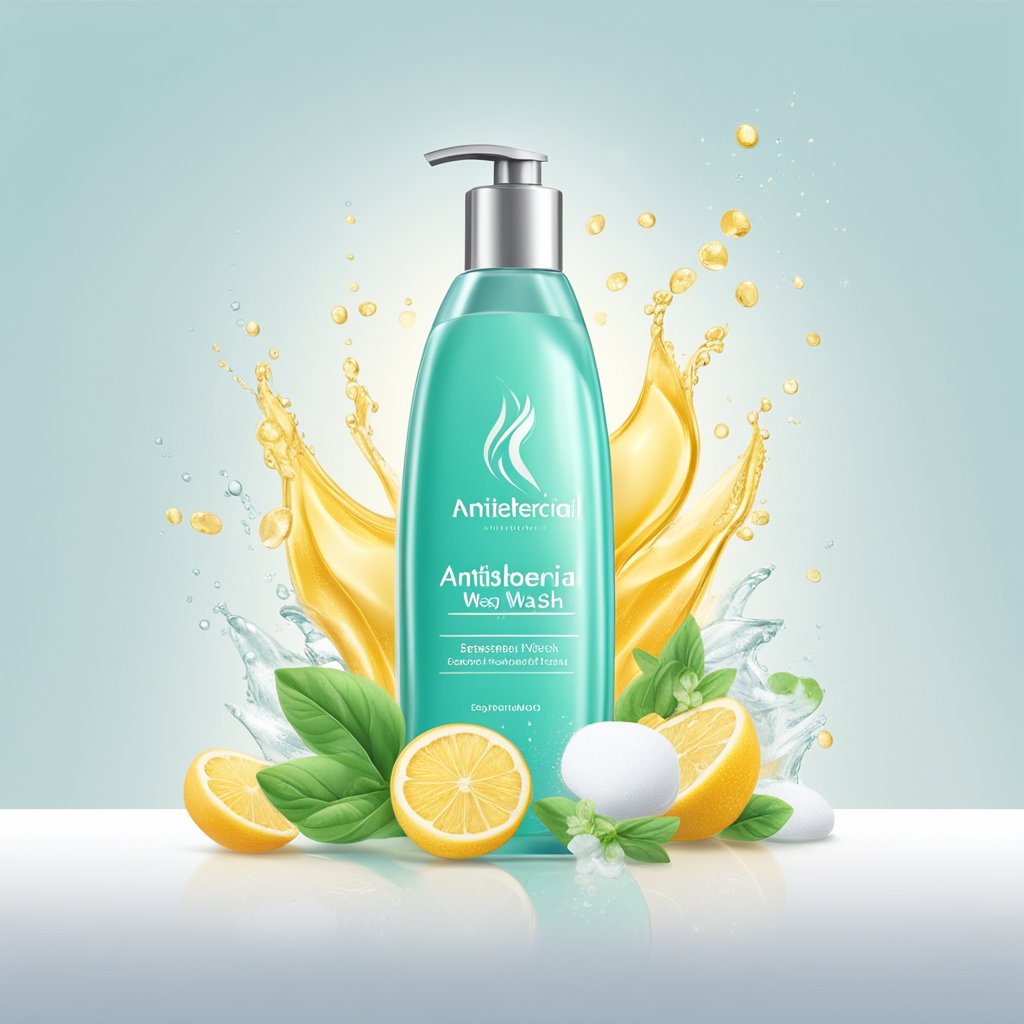In the quest for optimal skin health, finding a body wash that effectively battles germs without compromising skin integrity is essential. As a consumer, I understand that the myriad of options can be overwhelming, which is why it’s crucial to know the best antibacterial body washes that stand out in the market. These products offer a specialized formulation designed to prevent the onset of infections, keeping skin not only clean but also protected from bacterial invaders that pose a risk to our well-being.

Navigating through the sea of antibacterial body washes requires some insight into the key ingredients that make these products effective. As someone who values informed decisions, I prioritize understanding what ingredients work best for killing harmful bacteria while maintaining the skin’s natural defense barrier. This knowledge guides me in choosing the right antibacterial body wash tailored to my skin type and the specific needs of my lifestyle, whether it’s for daily use or for extra protection during activities that increase exposure to potentially harmful bacteria.
Key Takeaways
- Antibacterial body washes offer protection against germs and help prevent infections.
- Key ingredients are crucial for the effectiveness and skin compatibility of the body wash.
- Selecting the appropriate wash is dependent on individual skin type and lifestyle needs.
Understanding Antibacterial Body Washes

In my examination of antibacterial body washes, it’s vital to understand what differentiates them from regular soaps and their potential health advantages.
What Makes a Body Wash Antibacterial
Antibacterial body washes are formulated with specific ingredients designed to target and eliminate bacteria on the skin. Common antibacterial agents you might find in these products include triclosan, chlorhexidine, or tea tree oil. These ingredients can kill or inhibit the growth of bacteria, making them a key feature that distinguishes these washes from non-antibacterial counterparts.
Benefits of Using Antibacterial Body Wash
Using an antibacterial body wash comes with benefits, notably:
-
Reduction of harmful bacteria: By using an antibacterial body wash, I can specifically target and reduce the presence of harmful bacteria on my skin. This is particularly useful in preventing the spread of infection and in maintaining hygiene.
-
Possible antifungal properties: Some antibacterial body washes also contain antifungal ingredients. For someone like me, this offers a dual-action approach against both bacterial and fungal skin infections.
In crafting a body wash that is both antibacterial and beneficial for skin health, manufacturers must balance efficacy with safety, ensuring their products are gentle enough for daily use while effectively mitigating bacterial growth.
Key Ingredients in Antibacterial Body Washes
In my experience, the effectiveness of an antibacterial body wash hinges on the specific ingredients used. Some key components are directly responsible for eliminating bacteria, while others support skin health in various ways.
Natural Antibacterial Agents
Tea Tree Oil: Renowned for its antimicrobial properties, tea tree oil is often a primary agent in antibacterial body washes. Its ability to thwart bacteria makes it an excellent natural choice.
Eucalyptus Oil: Another powerful natural antibacterial element, eucalyptus oil not only combats bacteria but also offers a refreshing scent that invigorates the senses.
Moisturizing and Nourishing Components
Aloe Vera: My personal favorite for hydration, aloe vera deeply moisturizes the skin without leaving a greasy residue. It’s essential for maintaining skin’s moisture balance while using antibacterial products.
- Nourishing Ingredients: I make sure to look for components like vitamins and minerals that promote healthy skin. An ideal body wash will leave skin not only clean but also soft and well-nourished.
Fragrances and Essential Oils
When it comes to fragrances, I believe less is more. Essential oils can provide natural, subtle scents, enhancing the washing experience without overwhelming the senses. It’s important to select body washes with fragrances that are derived from essential oils rather than synthetic fragrances to avoid irritation and maintain the product’s natural profile.
- Essential Oils: Not just for scent, these oils like lavender or peppermint can have additional skin benefits, like soothing irritation or cooling effects. I choose body washes that incorporate them thoughtfully to harness these benefits.
Choosing the Right Antibacterial Body Wash
Selecting the correct antibacterial body wash is crucial. I’ll guide you through the importance of considering skin types and specific skin conditions.
For Different Skin Types
When purchasing an antibacterial body wash, knowing your skin type is essential. Here is a simple guide:
- Sensitive Skin: Choose a body wash with gentle, non-irritating ingredients. Avoid fragrances and colorants which can cause reactions.
- Oily Skin: Look for products that help regulate oil production without over-drying.
- Dry Skin: Opt for moisturizing formulas that contain hydrating elements like glycerin or aloe vera to combat dryness.
- Combination Skin: Seek a balanced body wash that can address both dry and oily areas effectively.
- All Skin Types: Hypoallergenic and dermatologist-recommended products are generally safe for all skin types, though individual reactions can vary.
For Specific Skin Conditions
Choosing a body wash that targets specific skin conditions is a proactive step in skincare management.
- Eczema: Moisturizing body washes with ingredients like ceramides and colloidal oatmeal can soothe eczema-prone skin.
- Psoriasis: Tar-based and salicylic acid body washes may help reduce scaling and inflammation.
- Acne: Look for body washes containing benzoyl peroxide or salicylic acid to help unclog pores and minimize breakouts.
I recommend patch-testing any new antibacterial body wash on a small skin area to ensure it doesn’t cause irritation. If in doubt, consulting a dermatologist is a wise decision to make an informed choice tailored to your skin’s specific needs.
Top Antibacterial Body Wash Recommendations
I’ve selected a range of antibacterial body washes that stand out for their efficacy and skin benefits. Below, you’ll find my top choices for overall use, alongside picks best suited for specific skin concerns.
Best Overall Antibacterial Body Washes
Dove: Renowned for its moisturizing properties, Dove offers an antibacterial body wash that cleanses the skin without stripping it of natural oils. It’s a go-to option for daily hygiene.
Dial: With a long-standing reputation, Dial’s antibacterial body wash is effective against common bacteria and is designed for frequent use by the entire family.
- Pros: Cleanses without over-drying; suitable for all skin types.
- Cons: Fragrance might not be suitable for all users.
| Brand | Skin Type Suitability | Fragrance | Size |
|---|---|---|---|
| Dove | All skin types | Mild | Various |
| Dial | All skin types | Varies | Various |
Specialized Body Washes for Skin Problems
Derma-nu Antifungal Therapeutic Soap: This body wash targets specific skin problems like athlete’s foot and jock itch, offering relief through essential oil infusions.
Dr. Lift Antibacterial Body Wash: This is another reliable choice for treating skin issues, containing natural ingredients geared towards preventing bacterial infections.
- Pros: Formulated for skin healing; contains natural ingredients.
- Cons: May require consultation for sensitive skin.
| Brand | Purpose | Key Ingredients | Size |
|---|---|---|---|
| Derma-nu | Athlete’s foot, Jock itch | Essential Oils | Various |
| Dr. Lift | Bacterial prevention | Natural ingredients | Various |
Frequently Asked Questions
In this section, I address common inquiries about antibacterial body washes, focusing on their ingredients, efficacy, and suitability for different skin types.
What components should one look for in a dermatologist-recommended antibacterial body wash?
A dermatologist-recommended antibacterial body wash typically contains triclosan or chlorhexidine. I make sure to check for moisturizing ingredients like glycerin as well to prevent skin dryness.
Which antibacterial body washes are most effective for controlling body odor?
For controlling body odor, antibacterial body washes with triclosan and triclocarban are highly effective. I find that brands like Dial and Defense offer options specifically designed to target and control body odor.
How does Dove’s antibacterial body wash compare to others in efficacy and skin sensitivity?
Dove’s antibacterial body wash is known for balancing efficacy with skin sensitivity. It contains mild surfactants and moisturizing agents, making it a good option for my skin, which may be prone to dryness or irritation.
What are the best options for antibacterial body wash suitable for sensitive skin?
I recommend Cetaphil or CeraVe antibacterial body washes for sensitive skin. These brands are non-irritating and free from harsh chemicals, fragrances, and dyes.
Which antibacterial body wash is most beneficial for preventing and treating skin boils?
Hibiclens is a medical-grade antibacterial body wash that I find effective for preventing and treating skin boils. It contains chlorhexidine, which is an antiseptic agent.
What are the characteristics of effective antibacterial soaps for managing female body odor and skin infections?
Effective antibacterial soaps for women often contain lactic acid and tea tree oil. These ingredients help maintain the natural pH and flora of my skin, which is crucial in managing body odor and skin infections.